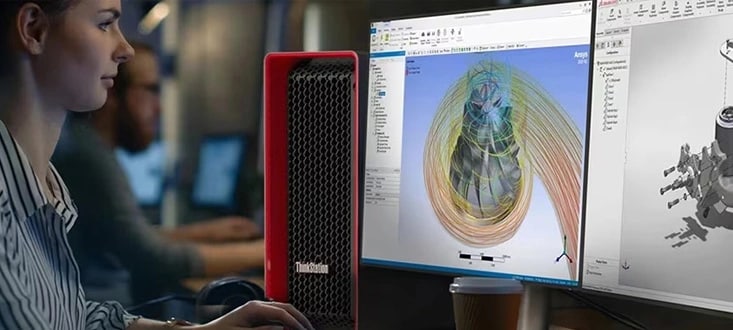-
Shop Lenovo Store
|
-

 Join a Community
Join a Community -

 Contact Us
Contact Us -

 Account
Account -

 Cart
Cart
Intel 10th Generation Desktop Processors
Intel® 10th generation Intel® Core™ processors power some of today's most advanced desktop PCs and All-in-Ones. Compared to earlier Intel CPUs, these 10th Gen Intel Core chips boast faster speeds, more cores and threads, and screaming-fast connectivity options – enough to lift even a basic desktop system to new heights.
The first 10th gen processors launched in 2019 and 2020, with Intel touting the benefits for content creators, business pros, and competitive gamers alike. In fact, at the time, Intel said its new Core i9-10900K chip powered the "world's fastest gaming desktop."1,2
Additional, still newer 10th gen Intel Core CPUs continue to come out. Most processor generations extend for 3-4 years or longer (often overlapping with other generations), meaning Intel's 10th gen chips should be powering high-end desktop PCs for years to come.
Lenovo desktop PCs with 10th generation Intel CPUs
At Lenovo, you'll find powerful 10th gen Intel Core processors across our desktop PC line-up:
- ThinkCentre business desktops: The best-known name in desktop PCs the world over
- Legion gaming towers and cubes: Powerful systems for gamers seeking a competitive edge
- IdeaCentre towers and all-in-ones: PCs with reliable performance and impressive style
- ThinkStation workstations: Top-of-the-line processing for demanding applications
Whether you’re looking to dominate the latest games, stream 4K video or boost your work output with the latest business productivity applications, Intel’s 10th gen processors deliver the goods – and empower you to do more.
10th Gen Intel Core desktop processor features
The Intel Core series of multi-core, multi-thread CPUs have long been market leaders. Each physical core acts as a separate CPU, and each core is split into multiple virtual cores or threads to process each command and computation you demand. Intel Hyper-Threading Technology splits up and pushes workloads through all the threads simultaneously, improving performance dramatically compared to CPUs without hyper-threading or with fewer cores and threads.
Intel's 10th gen desktop CPUs have higher maximum core and thread counts than earlier generations of the Core processor line. But there's much more to these new 10th gen chips:
- 10th gen desktop performance: When speed is critical, there's Intel Thermal Velocity Boost3 (enables out-of-the-box frequencies up to 5.0 GHz or more) and Intel Turbo Boost Max Technology 3.0 (automatically lifts speeds on lightly-threaded apps).
- 10th gen desktop connectivity: Now you can transfer large files faster than ever. Intel Ethernet Connection I225 enables twice the network speeds of 1 GB Ethernet.4,5 Or cut the cord entirely with Intel Wi-Fi 6 AX201.
- 10th gen desktop performance tuning: Push the limits on unlocked/overclockable 10th gen CPUs using Intel’s Enhanced Voltage Frequency Control, PCIe Overclocking (for discrete graphics), and Per-Core Hyper-Threading Controls.
Plus, like all the top processor manufacturers, Intel works with more than 200 popular independent software vendors (ISVs) to ensure its processors support all the features of today's most popular titles – from PC games and game engines to CAD applications and AI software.
Why choose a 10th Gen Intel Core processor desktop?
There’s a reason Intel’s 10th gen Core desktop processors are popular. They offer something for everyone: new frequency boosting options, better wireless capability, and more.
See Table 1 for a list of the notable features and benefits of Intel 10th generation desktop CPUs.*
Table 1: 10th generation Intel Core desktop processors – features and benefits
| FEATURE | BENEFIT |
|---|---|
Intel® Thermal Velocity Boost3 | Gamers and creators get up to a blazing 5.3GHz, right out of the box, for fast performance. |
Intel® Turbo Boost Max 3.0 | Delivers an automatic performance boost on lightly threaded applications. |
Support for up to DDR4-2933 Memory6 | Enjoy smooth game play, immersive realism, faster multitasking and greater productivity when creating. |
Intel® Hyper-Threading | Now available across the entire processor stack – from the entry-level Core i3 to the topmost Core i9. |
Thunderbolt™ 3 Support | Thunderbolt™ 3 ports are the fastest USB-C available – ideal for LAN parties and lightning-fast data transfers. |
Intel® Optane™ Technology Support7 | Smart memory and storage technology to accelerate PC response and access to documents, pictures, videos and applications. |
Intel® Ethernet Connection I225 | Delivers greater than twice the network speeds of 1 GB Ethernet on existing cabling.4,5 |
Intel® Wi-Fi 6 AX201 | Intel® Wi-Fi 6 AX201 offers nearly 3X faster wireless downloads and more reliable connections.4,5 |
Intel® UHD Graphics | Play 4K UHD videos with exceptional clarity, view and edit minute photo details, and play today’s top games. |
Intel® Quick Sync Video | Delivers excellent video conferencing, easy online sharing and fast video authoring/editing/conversion. |
* Table 1 lists the announced features of the first 10th gen Intel Core desktop CPUs to be released. Some features may not be available in every 10th gen Intel chip, and not every 10th gen Intel chip will be available in Lenovo desktop systems. Before buying, consumers should always confirm the stated specifications and performance estimates of any system they consider.
Comparing 10th generation Intel Core desktop CPUs
As always, when Intel launches a new processor generation, the improvements stretch across the entire Core line-up. So whether you’re eyeing an entry-level desktop with a Core i3 chip, a mainstream Core i5/Core i7 model, or a gaming tower or PC workstation with an advanced Core i9 CPU, there’s a 10th generation Core processor feature or performance metric that will interest you.
See Table 2 to learn how the initial 10th gen Intel Core desktop CPUs compared when first released.**
Table 2: 10th generation Intel Core desktop processors – Comparison8
| Intel Core i9 | Intel Core i7 | Intel Core i5 | Intel Core i3 | |
|---|---|---|---|---|
Maximum Base Frequency | 3.7 GHz | 3.8 GHz | 4.1 GHz | 3.8 GHz |
Intel® Thermal Velocity Boost3 Single/All Core Turbo Frequency | Up to 5.3/4.9 GHz | n/a | n/a | n/a |
Intel® Turbo Boost 3.0 | Up to 5.2 GHz | Up to 5.1 GHz | n/a | n/a |
Intel® Single Core Turbo Frequency | Up to 5.1 GHz | Up to 5.0 GHz | Up to 4.8 GHz | Up to 4.6 GHz |
Max Number of Cores/Threads | Up to 10/20 | Up to 8/16 | Up to 6/12 | Up to 4/8 |
Intel® Hyper-Threading | Yes | Yes | Yes | Yes |
Intel® Smart Cache Size | Up to 20 MB | Up to 16 MB | Up to 12 MB | Up to 8 MB |
Memory Type Support6 | Up to DDR4-2933 | Up to DDR4-2933 | Up to DDR4-2666 | Up to DDR4-2666 |
Number of Memory Channels | 2 | 2 | 2 | 2 |
Intel® UHD Graphics | 630 | 630 | 630 | 630 |
Graphics Dynamic Frequency | Up to 1200 MHz | Up to 1200 MHz | Up to 1200 MHz | Up to 1200 MHz |
Intel® Quick Sync Video | Yes | Yes | Yes | Yes |
Processor Core/Graphics/Memory Overclocking9 | Yes (select SKUs) | Yes (select SKUs) | Yes (select SKUs) | Yes (select SKUs) |
Intel® Optane™ Memory Support7 | Yes | Yes | Yes | Yes |
Intel® Virtualization | Yes | Yes | Yes | Yes |
Intel® BIOS Guard | Yes | Yes | Yes | Yes |
Intel® Boot Guard | Yes | Yes | Yes | Yes |
Intel® OS Guard | Yes | Yes | Yes | Yes |
Intel® Identity Protection | Yes | Yes | Yes | Yes |
** Any list of processor specifications by generation is a snapshot in time; newer, improved versions of each chip will likely be released over time. So Table 2 is accurate as regards the first 10th gen desktop processors released by Intel; consumers should confirm the exact configuration and performance estimates before buying a system.
Anyone eyeing a new desktop PC should take a long look at Intel’s 10th gen Core desktops. You’ll find them in virtually every Lenovo desktop series, from ThinkCentre desktops and IdeaCentre towers and all-in-ones to ThinkStation workstations and Lenovo Legion gaming towers and cubes.
1 Software and workloads used in performance tests may have been optimized for performance only on Intel microprocessors. Performance tests, such as SYSmark and MobileMark, are measured using specific computer systems, components, software, operations and functions. Any change to any of those factors may cause the results to vary. You should consult other information and performance tests to assist you in fully evaluating your contemplated purchases, including the performance of that product when combined with other products. For more complete information visit www.intel.com/benchmarks.
2 As measured by in-game benchmark mode performance (score or frames per second) where available, or frames per second where benchmark mode is unavailable. PC Gaming Processors Compared: 10th Gen Intel® Core™ i9-10900K, Intel® Core™ i9-9900KS, AMD Ryzen™ 9 3950X. Prices of compared products may differ. Configurations: Graphics: NVIDIA GeForce RTX 2080 Ti, Memory: 4x4GB DDR4 (2666, 2933 or 3200 per highest speed of the corresponding processor), Storage: Intel® Optane™ SSD 905P, OS: Windows 10 Pro 1909 v720 19H2(RS6). Results: 10th Gen Intel® Core™ i9-10900K scored better on the majority of the 25+ game titles tested.
3 Available only on 10th Gen Intel® Core™ i7 and i9 desktop processors.
4 Intel® Wi-Fi 6 AX201 requires specific hardware configurations. Discrete Intel® Wi-Fi 6 AX200 available for chipsets not supporting connectivity integration.
5 802.11ax 2x2 160MHz enables 2402Mbps maximum theoretical data rates, roughly 3X (2.8X) faster than standard 802.11ac 2x2 80MHz (867Mbps) as documented in IEEE 802.11 wireless standard specifications, and require the use of similarly configured 802.11ax wireless network routers.
6 DDR4 maximum speed support is 1 and 2 DPC for UDIMMs but only 1 DPC for SODIMMs. DDR4 2DPC UDIMM 2933 or 2666 is capable when same UDIMM part number are populated with in each channel.
7 Intel® Optane™ memory requires specific hardware and software configuration. Visit www.intel.com/OptaneMemory for requirements.
8 Intel technologies may require enabled hardware, software or service activation. Performance varies depending on system configuration. No computer system can be absolutely secure. Check with your system manufacturer or retailer or learn more at www.intel.com.
9 Unlocked features are present with select chipsets and processor combinations. Altering clock frequency or voltage may damage or reduce the useful life of the processor and other system components, and may reduce system stability and performance. Product warranties may not apply if the processor is operated beyond its specifications. Check with the manufacturers of system and components for additional details.
Intel, Intel Core, and Intel Optane are trademarks of Intel Corporation or its subsidiaries in the U.S. and/or other countries.




